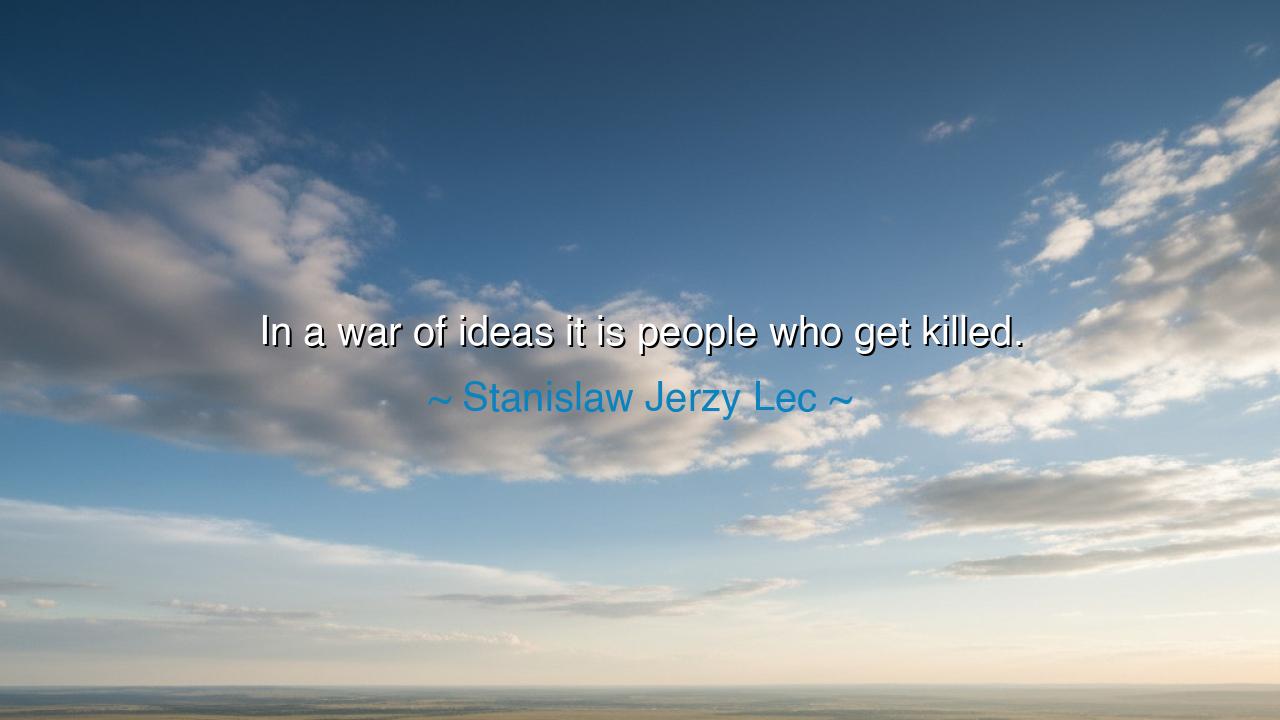
In a war of ideas it is people who get killed.






The Polish poet and thinker Stanislaw Jerzy Lec, who had witnessed the terrors of occupation and tyranny in the twentieth century, gave us this sobering truth: “In a war of ideas it is people who get killed.” His words cut through illusion with the sharpness of a sword. They remind us that lofty arguments, ideological battles, and struggles of philosophy do not remain in the realm of theory. When ideas clash, it is flesh and blood that pays the price. For though words seem harmless, once they harden into systems and are carried into action, they call forth armies, prisons, and executions.
Lec spoke from bitter experience. He had lived under Nazi oppression, seen the rise of Soviet power, and known what it meant to survive in a world where totalitarian regimes demanded absolute allegiance to their ideas. In such times, debates were not merely disputes of intellect; they were struggles for survival. Those who resisted the ruling ideology were branded enemies, silenced, imprisoned, or slain. Thus Lec’s saying is no abstraction—it is born of history, where the war of ideas spilled over into the suffering of ordinary men, women, and children.
Consider the fate of the French Revolution, which began with cries for liberty, equality, fraternity. These noble ideas promised the dawn of a new age. Yet, when taken to extremes, they birthed the Reign of Terror. The guillotine fell not upon concepts, but upon heads. What was at first a battle of principles soon became a harvest of lives. Ideas, though invisible, wield power over the visible world, and when they are enthroned without mercy, the innocent bear the wounds of their triumph.
Or reflect upon the struggle of the twentieth century between communism and fascism. Entire continents became battlegrounds for these opposing visions of society. Yet it was not the abstractions themselves that died—it was soldiers in the trenches, peasants in the fields, families in the cities. Ideological war is most cruel because it cloaks itself in righteousness, convincing men that the slaughter is necessary for a higher cause. But in the end, as Lec declares, it is the people who fall, crushed between the millstones of great systems.
The wisdom here is piercing: never forget that every idea, once unleashed into the world, touches human lives. To speak lightly of revolution, conquest, or purity is to risk kindling fires that will consume villages and cities. The ancients knew this. Plato warned of rulers guided by false philosophies, and Confucius taught that the words of leaders shape the fate of nations. Ideas are not harmless—they are the seeds of destiny, for good or for ill.
Therefore, let the teaching for our own lives be this: guard your ideas with humility, and weigh them always against their human cost. Do not cling to abstractions so tightly that you forget the beating hearts they may endanger. In your words, in your politics, in your convictions, remember always the faces of those who may bear the burden. True wisdom does not exalt the idea above the person; it honors the person above the idea.
And so, children of tomorrow, learn from the witness of Lec. When you engage in the wars of ideas, do so with compassion, never forgetting that your opponent is not an enemy to be destroyed but a soul to be understood. Refuse to sacrifice the living for the sake of the theoretical. Build not systems of domination, but communities of care. For in this way, you may transform the war of ideas into the dialogue of ideas, and prevent the tragedy of people being slain for visions that should have served them, not destroyed them.






LNLinh Ngoc
The concept that ‘in a war of ideas it is people who get killed’ feels painfully accurate. Ideas themselves don’t die, but the people who are caught in the middle of these ideological wars are the ones who suffer. How do we combat the destructiveness of ideological divisions? Is there a way to ensure that debates and disagreements stay within the realm of peaceful discussion rather than escalating into violence?
KLKhanh Linh
Lec’s statement about war of ideas really brings attention to how dangerous unchecked ideologies can be. It’s a stark reminder that while we argue about concepts and beliefs, innocent lives are often caught in the crossfire. How do we prevent this? Is it possible to engage in ideological battles without the extreme consequences, or does every conflict, in some way, lead to loss of life? What can we do to change this destructive cycle?
HHhai hoang
This quote speaks to the tragic irony of intellectual and ideological battles. While ideas may be debated in the safety of classrooms or forums, it’s the people who ultimately face the consequences. How do we ensure that discussions around sensitive issues don’t escalate into violence? At what point do the ideas being fought over lose their meaning, replaced by the bloodshed of those who never asked to be part of the struggle?
VTNguyen Van Thai
Lec’s comment about the war of ideas made me think about the price of intellectual conflict. The theory and practice of ideas often seem disconnected, but the reality is that people suffer the most. In many ways, ideologies can turn into tools of oppression, with human lives sacrificed in the name of a cause. Are we equipped to handle the weight of ideas, or do we continue to let them shape history in such destructive ways?
KKkhanh khanh
Stanislaw Jerzy Lec’s quote forces us to recognize the human cost of ideological struggles. War of ideas may sound abstract, but it often leads to the destruction of lives. How many times have debates over political or religious beliefs led to violence? Do people truly understand the consequences of supporting extreme ideologies? Can we ever reach a point where ideas are debated without leading to such devastation for the innocent?